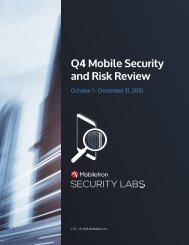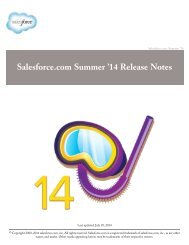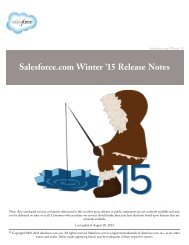salesforce_security_impl_guide
salesforce_security_impl_guide
salesforce_security_impl_guide
You also want an ePaper? Increase the reach of your titles
YUMPU automatically turns print PDFs into web optimized ePapers that Google loves.
Securing and Sharing Data<br />
Disabling External Organization-Wide Defaults<br />
Disabling External Organization-Wide Defaults<br />
Disabling External Organization-Wide Defaults results in one organization-wide default for each<br />
object.<br />
Before disabling this feature, set Default External Access and Default Internal Access to the<br />
same access level for each object.<br />
To disable the external organization-wide defaults:<br />
1. From Setup, click Security Controls > Sharing Settings<br />
2. Click Disable External Sharing Model in the Organization-Wide Defaults area.<br />
After disabling the external organization-wide defaults, you’ll see the Default Access setting instead<br />
of the Default External Access and Default Internal Access settings in the organization-wide<br />
defaults area. If you have User Sharing, the Default External Access settings for the account,<br />
contact, case, and opportunity objects remain visible but they are disabled.<br />
EDITIONS<br />
Available in:<br />
• Professional<br />
• Enterprise<br />
• Performance<br />
• Unlimited<br />
• Developer<br />
USER PERMISSIONS<br />
To disable external<br />
organization-wide defaults:<br />
• “Manage Sharing”<br />
Sharing Rules Overview<br />
Make automatic exceptions to your organization-wide sharing settings for defined sets of users.<br />
Note:<br />
Who Sees What: Record Access via Sharing Rules<br />
Watch how you can grant access to records using sharing rules.<br />
For example, use sharing rules to extend sharing access to users in public groups, roles, or territories.<br />
Sharing rules can never be stricter than your organization-wide default settings. They s<strong>impl</strong>y allow<br />
greater access for particular users.<br />
You can create these types of sharing rules.<br />
Type<br />
Account sharing rules<br />
Account territory sharing rules<br />
Campaign sharing rules<br />
Based on<br />
Account owner or other criteria,<br />
including account record types<br />
or field values<br />
Territory assignment<br />
Campaign owner or other<br />
criteria, including campaign<br />
record types or field values<br />
Set Default Sharing<br />
Access for<br />
Accounts and their associated<br />
contracts, assets, opportunities,<br />
cases, and optionally, contacts<br />
Accounts and their associated<br />
cases, contacts, contracts, and<br />
opportunities<br />
Individual campaign records<br />
EDITIONS<br />
Account and contact sharing<br />
rules are available in:<br />
Professional, Enterprise,<br />
Performance, Unlimited,<br />
and Developer Editions<br />
Account territory, case, lead,<br />
opportunity, and custom<br />
object sharing rules are<br />
available in: Enterprise,<br />
Performance, Unlimited,<br />
and Developer Editions<br />
Campaign sharing rules are<br />
available in Professional<br />
Edition for an additional cost,<br />
and Enterprise,<br />
Performance, Unlimited,<br />
and Developer Editions<br />
Only custom object sharing<br />
rules are available in<br />
Database.com<br />
Case sharing rules<br />
Case owner or other criteria,<br />
including case record types or<br />
field values<br />
Individual cases and associated<br />
accounts<br />
49






